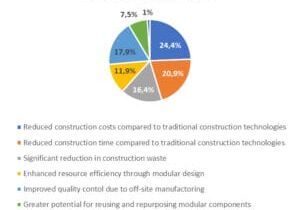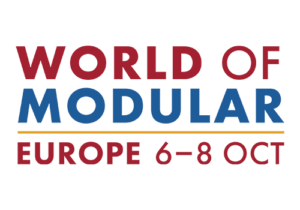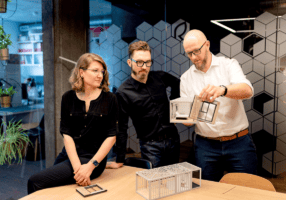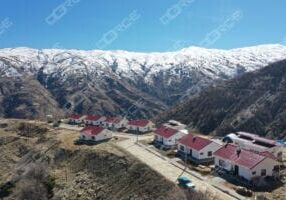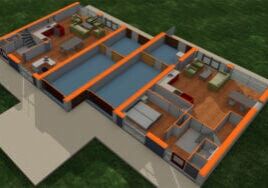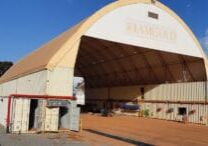About MBI's Canadian Council
The Modular Building Institute's Canadian Council serves as an advisory board on matters of importance to MBI members doing business in Canada. In addition to helping grow MBI's Canadian membership, this Council was established to promote collaboration and support among modular building manufacturers and companies in Canada:
- Provide additional leadership opportunities within MBI for members in Canada.
- Serve as an advisory board to MBI to ensure we are understanding our members’ needs.
- Serve as a forum for best practices and networking activities to be delivered more effectively by MBI.
“As a founding member of the Modular Building Institute’s Canadian Council, it has been very exciting to witness the rate of adoption that modular has experienced since 2017. There is a growing enthusiasm around new methodologies of building and the innovation coming out of Canada is impressive.
Of the many contributions that the council has made, it is the engagement and education of government, financial, and certification bodies such as the Canadian Standards Association (‘CSA’) and Canada Mortgage and Housing Corporation (‘CMHC’) that I am most proud of. Advocating on behalf of the Canadian modular industry is the primary role of our council and something my colleagues and I are very passionate about. We continue to make important headway in our efforts to penetrate the more mainstream construction markets.
The Council has brought a Canadian perspective to MBI on behalf of a contingent that has historically made up a significant portion of MBI’s total membership. In the second largest country in the world, Canadian construction is subject to a wide variety of factors and variables including environment, climate, politics and culture. As a result, geographical representation on the Canadian Council is critical and continues to deliver value to MBI’s Canadian membership.”
-Kevin Read, former Canadian Council chair
Canadian Council Directory
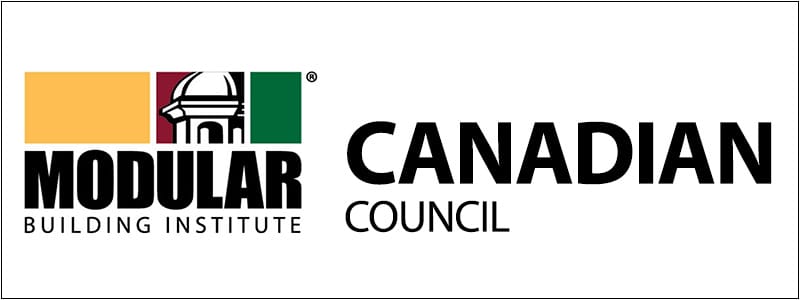
Featured Article
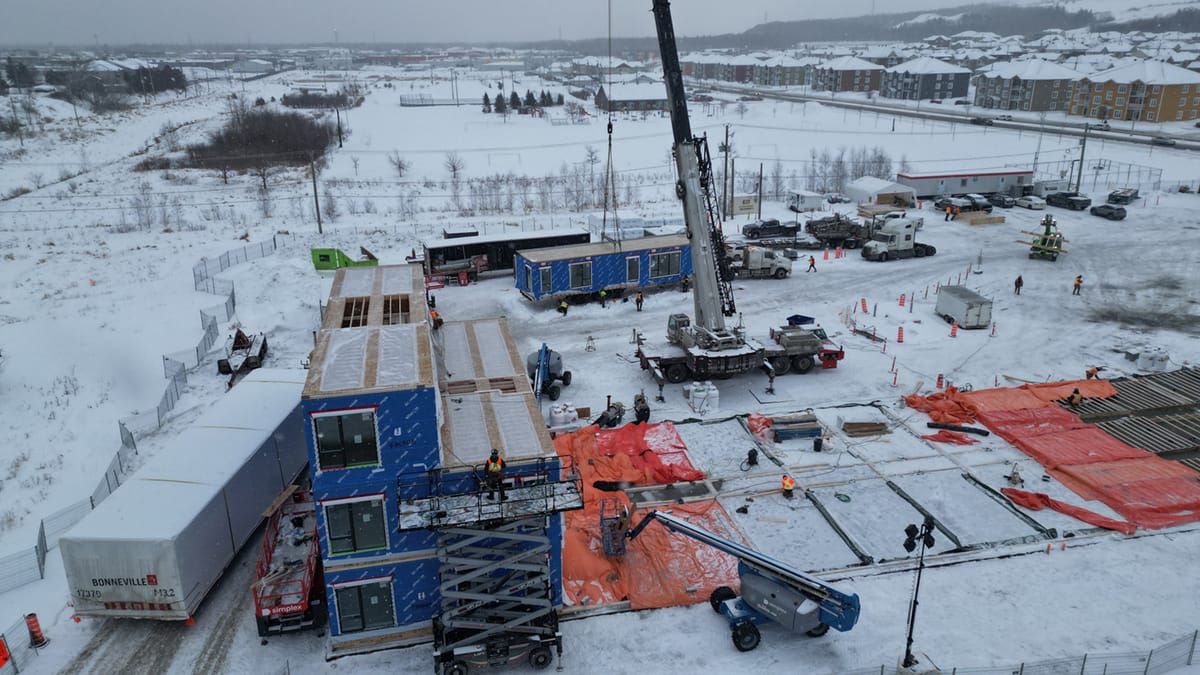
UTILE: Putting Modular Building on a Fast Track
In Quebec, UTILE is taking the lead in creating affordable modular buildings to help decrease the student housing shortage. During the process, the company discovered what it takes to make the transition to modular building a success.
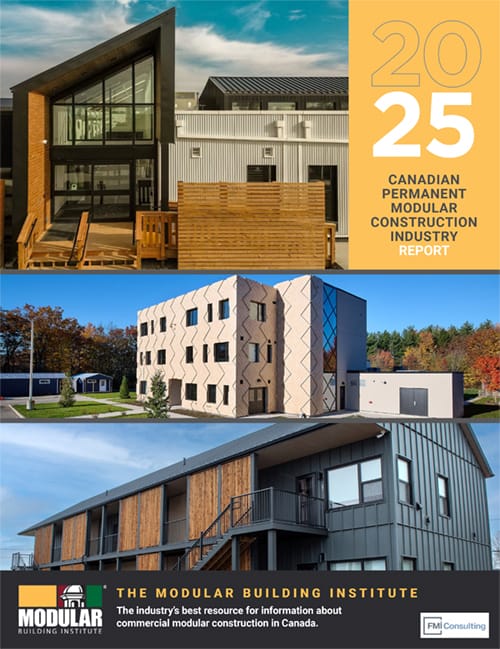
2025 Canadian Industry Report
Canadian Modular Construction Trends
In spring 2025, the Modular Building Institute and FMI Consulting began a collaborative effort to provide current, detailed, and actionable market insights. The outcome of that partnership, this report is intended to provide a means to measure and monitor changes across the industry, specifically describing five-year historical (2020-2024) and five-year forecast (2025-2029) data for volumes of modular Construction Put in Place (CPiP).
Join Us!
MBI's Councils are open to members at any time. Not yet a member? Join MBI today to get involved and enjoy all the benefits of membership.
International Modular Construction Articles
UTILE: Putting Modular Building on a Fast Track
In Quebec, UTILE is taking the lead in creating affordable modular buildings to help decrease the student housing shortage. During the process, the company discovered what it takes to make the transition to modular building a success.
Sobha Modular Teaches Developers How to Think Like Manufacturers
With its 2.7 million square foot factory in UAE, Sobha Modular is bringing both its high-end bathroom pods to high-end residences to Dubai while developing modular projects for the U.S. and Australia.
How LINQ Modular Innovates to Bring Modular To The Market in the UAE and Beyond
LINQ Modular, with an office and three manufacturing facilities in Dubai, is a modular firm based in United Arab Emirates. The company is on a mission: to break open the housing and construction markets in the Gulf Cooperation Council (GCC) area with modular.
Exploring the Role of Modular Integrated Construction (MiC) in Advancing Circular City Principles – A Survey of Stakeholder Perspectives
The survey findings highlight the significant potential of Modular integrated Construction (MiC) in advancing the development of circular cities. By reducing costs, accelerating construction timelines, and minimizing waste generation, MiC offers a promising approach to sustainable urban development.
From BIM to Execution: Turning a “Pretty Picture” into a Single Source of Truth for Off-Site Construction
When implemented properly, BIM becomes the company’s digital backbone: connecting teams, standardizing information and transforming data into actionable insights. It is the key to achieving lean, predictable operations where all phases – design, planning, procurement and project execution are empowered by a single source of truth.
Homes as Essential Infrastructure
The housing crisis is nothing new. Across the world, federal, state, and municipal governments of all sizes are struggling with how to provide more affordable housing—quickly—to those who need it. In Canada, Paul Halucha, Deputy Minister of Housing, Infrastructure, and Communities Canada (HICC), argues that the federal role in housing has shifted from funding at arm’s length to actively shaping outcomes.
Building the Future, Offsite
In the face of a national housing crisis, England stands at a critical inflection point where innovation, scale, and public-private partnerships must converge to meet an urgent need: more homes, and fast. Homes England is helping reshape the housing market by actively supporting MMC through a strategic blend of land development, financing, and grants.
How POJI and MOKO Are Industrializing Modular Construction Through Automated Engineering Systems
Working with Scandinavian Industrialized Building System (SIBS), POJI and MOKO helped realize a modular city concept located in Järfälla municipality of Stockholm, Sweden, with 350 apartments, communal areas, restaurants, small shops, and a preschool in a pleasant mix with experiential architecture and greenery.
Inside Boutique Modern’s Mission to Make First Homes Affordable and Efficient in The U.K.
The U.K.-based firm has been in business for 12 years, manufacturing houses for both private clients and local government, with a large chunk of its business coming from “affordable” and social housing. Working in a 32,000 square-foot factory in Newhaven, Sussex, Boutique Modern is changing decades-old thinking about constructing houses, all through the use of modular.
Housing in the EU: What’s Next for Modular and Offsite?
According to EUROSTAT, the EU averages for housing types in cities is around 70% of people live in apartments and 30% live in houses. The suburbs and towns have around 40% living in apartments and 60% living in houses. Without exception, the modular building industry can provide new build solutions for all of these requirements.
How BIM & AI are Improving Modular Construction Outcomes Across Europe
Digitalization and ever-advancing project modelling software have been aiding traditional manufacturers, builders, and designers for years. More recently, tech-savvy modular and offsite construction stakeholders have also embraced these tools, adding their own knowledge and data to create newer, faster, more efficient ways of building. Together with new BIM- and AI-powered tools, these builders are now pushing the boundaries of what’s possible with offsite construction and energy management.
How LAMOD is Using Modular to Address Inefficiency, Sustainability, and the Future of Construction
As developers, designers, and contractors seek to understand the evolving needs of the modular industry, no one is as well-versed in the benefits of going modular as Mārcis Kreičmanis. As the co-founder and CBDO of LAMOD in Riga, Latvia, Mārcis has made it his ultimate goal to address the inefficiencies of traditional construction.
Eisa Lee, the “Bilingual” Architect
Now as the founder of XL
Architecture and Modular Design in Ontario, Canada, she applies not just her education as a traditional architect but an entire holistic view on modular design. It’s this expansive view that guides her work on being a true partner that bridges the gap between architects and modular factories as they collaborate on the design process.
Safe Modular Construction with Aerofilm Air Caster Transport
In collaboration with Aerofilm Systems, Heijmans developed innovative skids using air caster technology for moving modules easily and safely. These pallets are equipped with an auto-flow system, making operation extremely simple.
How Rebel Concept Harnesses AI as a Design Tool to Improve the DFMA Process
“The complexity of projects and the size of project are so large, and the technology is so complicated that AI would do it so much faster than we are,” says Kris Droszcz, CEO at Rebel Concept. “Everybody’s struggling to control the manufacturing processes according to the design. And I think that’s what AI will do.”
DORÇE Navigates Mountainous Terrain, Extreme Weather to Help Rebuild Türkiye
The February 6 earthquakes in 2023 were enormous. In response, DORÇE moved quickly, obtaining a government bid to help create housing and multipurpose structures—both temporary and permanent—for earthquake victims and laborers hired for reconstruction efforts.
True Modular Building Seeks to Revolutionize Housing. It’s Next Stop: MBI’s World of Modular Europe
True Modular Building (TMB) specializes in crafting attainable, eco-friendly, and comfortable build-to-rent (BTR) housing with modern designs and customizable features, ensuring that residents feel at home both today and tomorrow.
From Toronto to Suriname: A Global Modular Building Story
When I AM Gold – a Canadian gold mining operation based in Toronto, Ontario – wanted to expand its mining operations in Suriname, it knew it would also need to expand its infrastructure. More specifically, they needed to build a mechanical services compound that would allow their local crews to maintain and equipment critical to their mining operations. They also knew that it would be a challenge.
Arctic Security and Sovereignty: The Role of Modular Structures
While the geopolitical challenges in the Arctic are immense, the physical environment of the region presents its own set of obstacles. The harsh climate, extreme weather conditions, and logistical difficulties make it challenging to establish and maintain a sustained presence in the Arctic. In this context, modular structures offer a practical and effective solution, providing the flexibility, speed, and resilience needed for operations in such a remote and hostile environment.
The Digitalization of Offsite Construction: Trends & Best Practices to be Featured at World of Modular Europe
Speakers from around the UK and Europe will be presenting at World of Modular Europe, including Michael Hough, principal at Ireland’s MJH Structural Engineers, and Franco Vietti, associate at Holland-based Green Prefab. Both Hough and Vietti will be sharing—among other things—their insights on the industry based on their 20-plus year careers.




